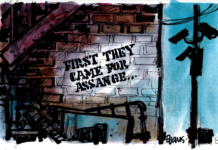Once a world leader in focusing the benefits of women-centred care, the government-appointed Midwifery Council that regulates the practice of midwifery is now intending to erase the words “woman” and “mother” from its scope of practice.
The replacement of the words “woman” and “mother” with the broader term “whānau” was among other changes to the current scope of practice opposed by 90% of respondents in a feedback document released by the Midwifery Council in March 2023.
Despite this, the revised version of the scope of practice released late last year, and due to be implemented in June 2024, has barely changed from earlier versions.
The apparent failure to genuinely listen to concerns raised by midwives and others has led to a petition calling on the House of Representatives to investigate the Midwifery Council’s removal of women and babies from the revised scope of practice.
More than 2000 people have so far signed the petition. The deadline for signatures will close on 1 March.
Ashburton midwife Deb Hayes initiated the petition just two weeks ago saying the proposed revised scope is not “fit for purpose as it is written”. She has seen a growing trend to use “gender neutral language” in health services, but she says that sex-based language is essential to midwifery.
“As midwives, our practice is based on a partnership with women during pregnancy, labour and childbirth, and the six weeks postnatal period. This includes supporting the establishment of breastfeeding and monitoring the health of mother and her baby.”
Mrs Hayes says the revised scope of practice does not mention breastfeeding and the only reference to babies is to “infant health care”. This is deceptive as midwives support mothers with their newborn babies up to six weeks of age and then hand over responsibility to well child providers such as Plunket.
Women’s Rights Party co-leader Jill Ovens says the woman and her rights have been subsumed into the broader term, “whānau”, a term that is widely understood to refer to the extended family or family group.
Feedback during consultation on the revised scope of practice showed that many midwives were concerned that use of the term “whānau” may be broadening their scope beyond their education and experience with the potential to make it unsafe for midwives, women and their whānau.
“The scope of practice for all regulated professions should be clear and specific as it sets the boundaries of each profession’s practice. This protects both the professionals and their consumers,” Ms Ovens says.
Midwifery is a regulated profession that operates within the Health Practitioners Competence Assurance Act 2003 (the HCAA).
Former College of Midwives Chief Executive Karen Guilliland says midwives provide care to individual women, also encouraging the participation of whānau in each woman’s care and promoting health of whānau.
However, Ms Guilliland says it is the woman who defines her whānau and decides how others will be involved in her care.
“This is a very important principle because it upholds women’s rights, so long fought for and, as we can see in many parts of the world, so easily lost through political or other contextual changes.”
Ms Guilliland says the interchangeable use of the word “midwife” with “kahu pōkai” appears to exclude both the woman and the midwife as it could be applied to any care-giving workforce. The word “midwife” originates from the Old English word “mid” and “wife” which translates to “with women” in today’s terms.
“I remember the New Zealand College of Midwives Kaumatua Mina Timutimu’s advice that traditional Māori interpretation of pregnancy and birth highlighted the woman-centred and sacred nature of childbirth and the word ‘midwife’ as the care giver does this. Her view was that hapu women hold a sacred place as it is only pregnant women who have the power to carry the new generation.”
While the profession has changed dramatically through the centuries, the concept of being “with women” has remained the same. Ms Ovens, who previously worked with the midwives’ union, says midwives pride themselves on providing women-centred, individualised care in a partnership with women that empowers women and supports women’s right to control their own bodies.
“Midwifery is inherently feminist in its orientation and this seems to have been lost in the revised scope of practice,” Ms Ovens says.





The attacks on women are never ending.
While I understand the focus on the wholesale erasure of women as mothers, which affects all women, I was even more horrified to learn that the Midwifery Council is apparently encouraging persons who were born with XY chromosomes (ya know, males), to ‘chestfeed’.
It is possible for men to excrete liquids (generally, more paste than liquid) from their nipples with extreme endocrinologic disruption due to being very fat or taking very dangerous substances, but the ‘milk’ produced is not even remotely comparable to formula, let alone breast milk. Encouraging this practice risks the health of babies and serves no purpose beyond gratifying the strange desires of those whom engage in it. I doubt there are more than ten male ‘chestfeeders’ in this country, but even one would be a travesty.